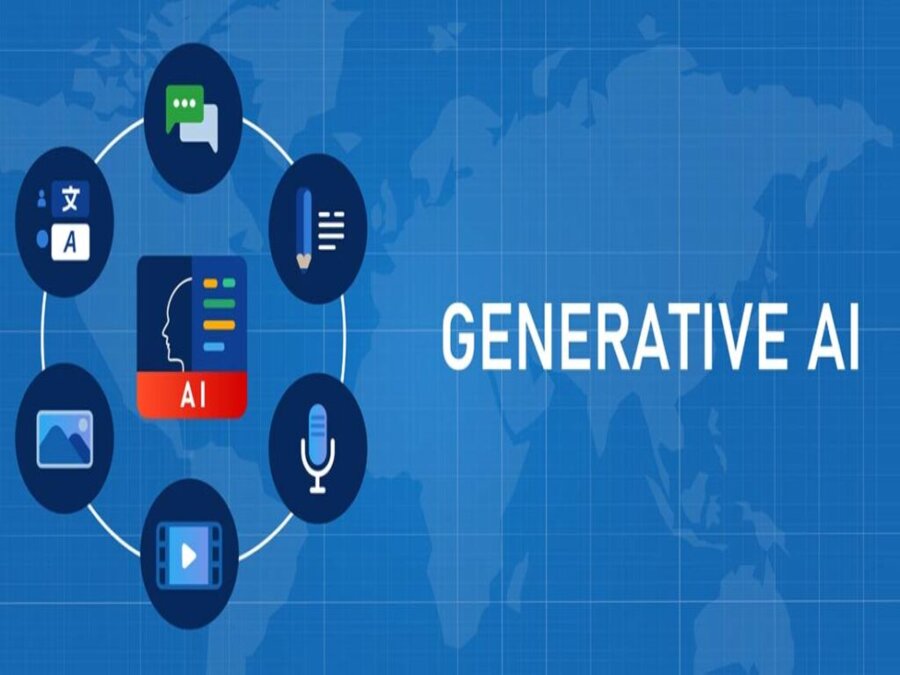Generative Intelligence: A Paradigm Shift in Technology
Artificial Intelligence (AI) has advanced significantly in recent years, and one of its most interesting applications is Generative AI. Generative AI refers to AI technology that can be used to create content such as text, images, video, audio, code, and so on. Generative AI generates the outputs based on the information it has been trained with. Neural Networks, Machine Learning, and Deep Learning techniques are used in Generative AI to produce content that closely mimics human-created output. There is a growing trend among both organizations and individuals to utilize Generative AI tools for generating content across various categories.
Generative AI finds practical uses in various real-world scenarios such as text generation, audio and visual creation, program code generation, translation of languages, gaming, web design, online search, healthcare, marketing, artistic design, financial operations, manufacturing, and more.
Generative AI tools
- GPT-4 (Large Language Model (LLM))
- ChatGPT (Chatbot, Content Generation)
- AlphaCode (Transformer-based language models to generate code and smart filtering)
- GitHub Copilot (Intelligent Code Suggestions)
- Bard (Chatbot, Content Generation)
- Cohere Generate (Content Generation)
- Claude (AI Assistant)
- Synthesia (Video Creation)
- DALL-E 2 (Image and Art Generation)
Influence of Generative AI
Generative AI is set to revolutionize the business through the following means:
- Producing content that is remarkably impressive and nearly indiscernible from human-generated interfaces.
- Facilitating fast and deeper interactions between humans and machines.
- Automating numerous repetitive tasks.
- Significantly diminishing manual labor, resulting in decreased overall expenses.
Generative AI possesses the potential to significantly transform business practices by initiating extensive innovations. Businesses that will smartly leverage the new technology can gain a tremendous amount of competitive advantage.
In addition to the positive effects, there are specific issues that require attention:
- Data Security – Data provided in Generative AI models has the potential to reemerge into the real world. Consequently, numerous businesses have initiated measures to restrict the disclosure of sensitive data to these models.
- Copyright Infringement – AI models are trained on datasets sourced from the public internet, there is a legal ambiguity concerning whether the outputs produced by these models constitute replicas of copyrighted materials.
- Lack of Transparency – Not possible to authenticate the accuracy of the generated assertions as these models provide no attribution for the facts.
- Impact on Jobs – In various sectors, certain jobs might be replaced, new ones could emerge, and others might be enhanced, and this impact would only get amplified as AI models continue to develop over time.
How is Generative AI changing the IT Industry?
NTT DATA’s Chief Digital Officer Tanvir Khan says, Generative AI is poised to bring about a significant disruption to the IT sector, similar to the impact of offshore outsourcing two decades ago. This technology will greatly reduce the need for manual labor for content generation as it can create web content and do writing, but most importantly it can write software. So, the biggest impact in the code generation space.
AI Governance Policy
Regulation is required for AI to become more responsible. A spectrum of challenges including trademark disputes, plagiarism, picture manipulation, data privacy, copyright infringement, and much more. The data has been made available to the public for use, but no one is monitoring its use. There is no regulator to determine what is right or wrong with the generated content.
Example: When you interact with ChatGPT, you are actually training it. And you end up putting some private information that will essentially become public.
Each nation must formulate its distinct AI governance framework. However, the ethical issues concerning AI are extensive, and numerous enterprises are currently in the preliminary phases of formulating their regulatory frameworks. Constructing an effective governance structure for generative AI necessitates the integration of three essential components: information security, privacy safeguards, and regulatory compliance.
Conclusion
Generative AI continues to evolve and refine its accuracy and its transformative impact on businesses is undeniable. It is fundamentally altering how both individuals and companies operate. Failing to adopt digital transformation puts businesses at risk of lagging behind in today’s rapidly changing world. In essence, a quote from Mark Murphy (Head, Enterprise Research, J.P. Morgan), “It’s critical that Generative AI is used responsibly and governed properly, it can amplify human potential instead of becoming too disruptive.”
Source:
- https://www.techtarget.com/searchenterpriseai/definition/generative-AI
- https://www.bitsathy.ac.in/generative-ai-in-metaverse/
- https://www.bitsathy.ac.in/ai-generative-models/

